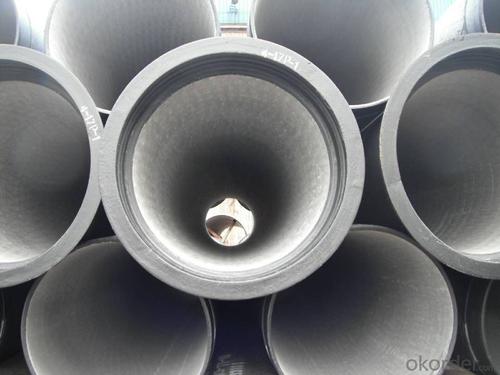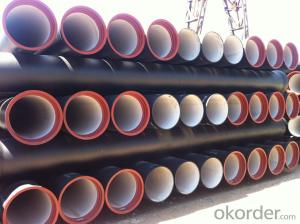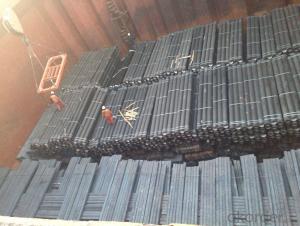DUCTILE IRON PIPE DN150 k9
- Loading Port:
- China Main Port
- Payment Terms:
- TT OR LC
- Min Order Qty:
- -
- Supply Capability:
- -
OKorder Service Pledge
OKorder Financial Service
You Might Also Like
Specification:
1) The standard of pipe: ISO2531:1998, K9
2) Effective length: 6m
3) Inner cement line: Portland cement line as per ISO4179
4) Zinc coating: at least 130g/m2 as per ISO8179
5) Bitumen painting: at least 70um as per ISO8179
6) With 100% quantity of NBR ring, or SBR ring, or EPDM ring as per ISO4633
7) DN80mm-800mm
8) High strength, lighter than grey iron, good corrosion resistance, no furring, small flow resistance, easy fixing, long life tome about 100 yeas
9) Produced by Hangzhou chunfeng machine
10) Checked by automatic inspection equipment
11) Composition:
Chemical composition | |||
Chemical composition | Ductile Cast Iron Pipe (%) | Grey iron pipe (%) | Steel pipe (%) |
C | 3.5-4.0 | 3.2-3.8 | 0.1-0.2 |
Si | 1.9-2.6 | 1.4-2.2 | 0.15-0.4 |
Mn | 0.15-0.45 | 0.4-0.6 | 0.3-0.6 |
P | ≤0.06 | ≤0.3 | 0.02-0.03 |
S | ≤0.02 | ≤0.1 | 0.02-0.03 |
Mg | 0.03-0.06 |
|
|
12) Feature:
Mechanical properties | |||
| Ductile Cast Iron Pipe | Grey Iron Pipe | Steel Pipe |
Tensile Strength(Mpa) | ≥420 | 150-260 | ≥400 |
Yield Strength(Mpa) | ≥300 | No Confirmation | No Confirmation |
Bending Strength(Mpa) | ≥590 | 200-360 | ≥400 |
Elongation (%) | ≥10 | Neglected | ≥18 |
Brinell Hardness(HBS) | ≤230 | ≤230 | About 140 |
13) T type mechanical joint
14) Packing: in bulk or container
- Q: What are the different methods for joining ductile iron pipe?
- There are several methods for joining ductile iron pipe, each with its own advantages and limitations. One common method is mechanical joint (MJ) coupling, which involves using a rubber gasket and a set of bolts and nuts to create a watertight seal between pipe sections. This method is relatively quick and easy to install, but it requires a skilled technician to ensure proper alignment and bolt tightening to prevent leakage. Another method is flanged joint, where the pipe ends are equipped with flanges that are bolted together using gaskets to create a tight seal. This method allows for easy disassembly and reassembly of pipe sections, making it suitable for applications that require frequent maintenance or modifications. However, it is more expensive and time-consuming compared to other methods. One widely used method is push-on joint (POJ), which involves using a rubber gasket and a special lubricant to slide the pipe ends together. This method provides a reliable and watertight seal, and it is relatively quick and easy to install. However, it requires proper alignment and care to avoid damaging the gasket during assembly. Another option is restrained joint (RJ), which uses a mechanical joint coupling with additional features to resist axial forces or thrusts. This method is commonly used in applications where the pipe is subject to internal pressure, external loads, or seismic activity. It provides a secure and rigid connection but may require specialized tools and training for installation. Finally, welding is another method for joining ductile iron pipe. It involves heating the pipe ends and melting a filler metal to create a permanent bond. This method provides a strong and durable connection, but it requires skilled welders and additional time for preparation, welding, and cooling. Welding is often used for specific applications, such as joining sections of pipe with different diameters or connecting to other materials. In summary, the different methods for joining ductile iron pipe include mechanical joint coupling, flanged joint, push-on joint, restrained joint, and welding. The choice of method depends on factors such as the application requirements, installation time, maintenance needs, and budget.
- Q: Can ductile iron pipes be used for water distribution networks in rural areas?
- Yes, ductile iron pipes can be used for water distribution networks in rural areas. Ductile iron pipes have excellent strength and durability, making them suitable for various applications, including water distribution. They can withstand high pressure, provide a long service life, and have good resistance to corrosion and external stresses. Additionally, ductile iron pipes are relatively cost-effective and require minimal maintenance, making them a reliable choice for water distribution networks in rural areas.
- Q: What are the different pressure classes available for ductile iron pipe?
- The different pressure classes available for ductile iron pipe include Class 100, Class 150, Class 200, Class 250, Class 300, Class 350, and Class 400.
- Q: How can the ductile iron pipe elbow be fixed?
- Ductile cast iron pipe in the groove pipe connection technology is also called the lathedog connection technology, has become the most liquid and gas pipeline connection technology, although this technology is later than foreign in domestic development time, but because of its advanced technology, domestic market quickly received. Since 1998, it has been developed and applied in just a few years. It has gradually replaced two traditional ways of pipe connection, such as flange and welding. Not only technically more mature, the market is generally recognized, but also by the national laws and regulations actively guide the policy. The application of grooved pipe connection technology makes the complex pipe connection procedure simple, fast and convenient. Took a big step forward in pipeline connection technology.
- Q: What is the expected joint restraint method for ductile iron pipes?
- The expected joint restraint method for ductile iron pipes is typically mechanical joints or push-on joints. These joints provide a secure and leak-free connection between the pipes, ensuring the stability and integrity of the pipeline system. Mechanical joints involve the use of rubber gaskets and bolts to tightly seal the joint, while push-on joints utilize a groove and rubber gasket system to create a watertight seal. Both methods offer excellent joint restraint capabilities, allowing for the effective transmission of fluids or gases through the pipeline without the risk of joint separation or failure. Additionally, these joint restraint methods also facilitate ease of installation and maintenance, making them a preferred choice for ductile iron pipe systems.
- Q: Are ductile iron pipes suitable for use in industrial applications?
- Yes, ductile iron pipes are suitable for use in industrial applications. Ductile iron pipes are known for their high strength and durability, making them ideal for handling the demands of industrial environments. They are resistant to corrosion and can withstand high pressures and temperatures. Additionally, ductile iron pipes have excellent impact resistance, making them suitable for use in areas with heavy traffic or potential for mechanical damage. Their flexibility allows them to absorb vibrations and shocks, further enhancing their suitability for industrial applications. Overall, ductile iron pipes are a reliable and cost-effective choice for various industrial sectors such as water and wastewater treatment, mining, power generation, and chemical plants.
- Q: Can ductile iron pipes be used in areas with high soil settlement?
- Ductile iron pipes are suitable for areas with high soil settlement due to their strength and durability. They can withstand external loads and ground movement, making them an ideal choice for such areas. Additionally, these pipes have a high resistance to corrosion, making them even more suitable for use in areas with high soil settlement. However, it is important to consider factors such as proper installation techniques, appropriate bedding and backfill materials, and regular maintenance to ensure the longevity and performance of the ductile iron pipes in these areas. Consulting with a qualified engineer or pipe manufacturer can provide more specific guidance based on the site's conditions and requirements.
- Q: Can ductile iron pipes be installed outdoors?
- Graphite is exist in spherical form, usually graphite size is 6-7, casting spheroidization grade control requirements for 1-3 quality (spheroidization rate greater than 80%), so the mechanical properties of the material itself has been improved, has the essence of iron, steel performance. The annealed ductile iron pipe is composed of ferrite and pearlite. The mechanical properties of the ductile iron pipe are better.
- Q: How do ductile iron pipes perform in high-temperature steam applications?
- Ductile iron pipes excel in high-temperature steam applications thanks to their remarkable performance. They can withstand elevated temperatures and maintain their structural integrity, making them highly suitable for steam distribution systems. One notable advantage of ductile iron pipes in high-temperature steam applications lies in their exceptional thermal conductivity. This property enables efficient heat transfer, ensuring that the steam is delivered at the desired temperature with minimal loss. Additionally, the high thermal conductivity of ductile iron helps to mitigate the risk of thermal expansion and contraction, which can lead to pipe failure or leakage. Moreover, ductile iron pipes boast a high melting point, typically around 2000°F (1093°C). This resistance to extreme temperatures encountered in steam applications ensures that the pipes remain intact and do not deform, guaranteeing the reliability and longevity of the piping system. Another crucial factor contributing to the performance of ductile iron pipes in high-temperature steam applications is their corrosion resistance. These pipes are usually coated with epoxy or other protective materials to prevent corrosion and maintain their structural integrity, even in aggressive steam environments. This corrosion resistance ensures that the pipes can endure harsh conditions and operate efficiently over an extended period. In conclusion, ductile iron pipes are an ideal choice for high-temperature steam applications due to their excellent thermal conductivity, high melting point, and corrosion resistance. These properties make them a reliable and long-lasting option for steam distribution systems, ensuring the safe and efficient transportation of steam at elevated temperatures.
- Q: How does ductile iron pipe handle ground movement and settlement?
- Ductile iron pipe is known for its excellent ability to handle ground movement and settlement. Due to its inherent strength and flexibility, it can withstand significant ground shifts without experiencing major damage or failure. One of the key features of ductile iron pipe is its high tensile strength, which allows it to withstand external forces and pressures. This strength enables the pipe to resist the effects of ground movement, such as soil settlement, subsidence, or shifting due to seismic activity. Moreover, ductile iron pipe has inherent flexibility, which allows it to absorb and distribute stress caused by ground movement. The pipe's flexibility helps to minimize the impact of settlement by allowing it to adjust and adapt to changes in the surrounding soil. This characteristic helps prevent the pipe from cracking, breaking, or leaking when the ground shifts or settles. Additionally, ductile iron pipes are often installed with flexible joints, such as push-on or mechanical joints, which further enhance their ability to accommodate ground movement. These joints provide a degree of flexibility and movement, allowing the pipe to adjust to changes in the soil without experiencing stress concentrations or structural failure. Furthermore, ductile iron pipe is highly resistant to corrosion, which is another important factor in its ability to handle ground movement and settlement. Corrosion can weaken pipes and make them more susceptible to damage during ground shifts. However, the corrosion-resistant properties of ductile iron help maintain the pipe's structural integrity and durability, even in challenging soil conditions. In summary, ductile iron pipe is well-suited to handle ground movement and settlement due to its high tensile strength, flexibility, and corrosion resistance. These properties allow the pipe to withstand external forces and adapt to changes in the surrounding soil, minimizing the risk of damage, leaks, or failure.
Send your message to us
DUCTILE IRON PIPE DN150 k9
- Loading Port:
- China Main Port
- Payment Terms:
- TT OR LC
- Min Order Qty:
- -
- Supply Capability:
- -
OKorder Service Pledge
OKorder Financial Service
Similar products
Hot products
Hot Searches
Related keywords


























